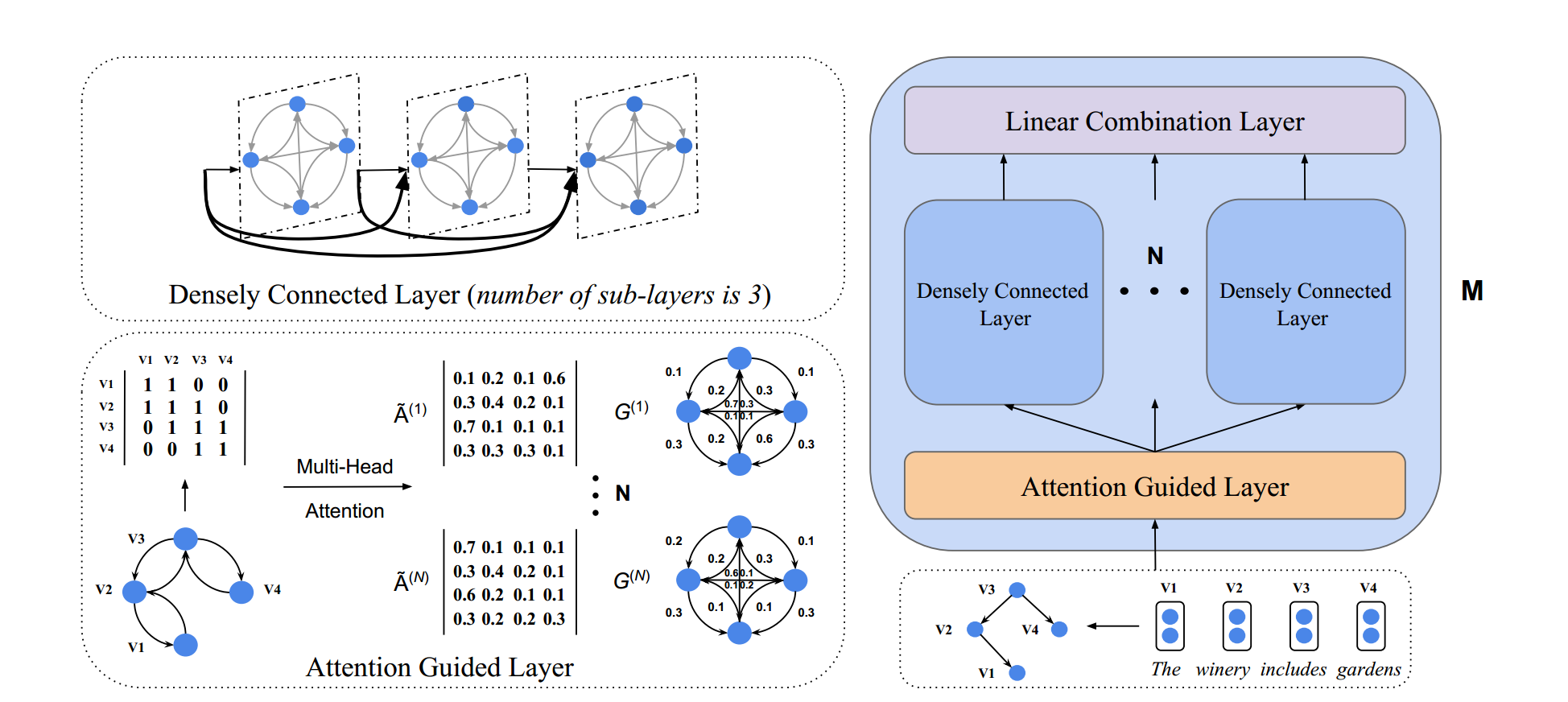Attention Guided Graph Convolutional Networks for Relation Extraction
This paper/code introduces the Attention Guided Graph Convolutional graph convolutional networks (AGGCNs) over dependency trees for the large scale sentence-level relation extraction task (TACRED).
You can find the paper here
See below for an overview of the model architecture:
Requirements
Our model was trained on GPU Tesla P100-SXM2 of Nvidia DGX.
-
Python 3 (tested on 3.6.8)
-
PyTorch (tested on 0.4.1)
-
CUDA (tested on 9.0)
-
tqdm
-
unzip, wget (for downloading only)
We have released our trained model and training log in this repo. You can find the logs under the main directory and the trained model under the saved_models directory. Our released model achieves 69.0% F1 score as reported in the original ACL paper. Moreover, in our Arxiv version, we also reported the mean and std of F1 score, the stats is 68.2% +- 0.5% based on 5 trained models. The random seeds are 0, 37, 47, 72 and 76.
There is no guarantee that the model is the same as we released and reported if you run the code on different environments (including hardware and software). If you train the model by using the default setting, you will get the exact same output in the logs.txt.
Preparation
The code requires that you have access to the TACRED dataset (LDC license required). Once you have the TACRED data, please put the JSON files under the directory dataset/tacred.
First, download and unzip GloVe vectors:
chmod +x download.sh; ./download.sh
Then prepare vocabulary and initial word vectors with:
python3 prepare_vocab.py dataset/tacred dataset/vocab --glove_dir dataset/glove
This will write vocabulary and word vectors as a numpy matrix into the dir dataset/vocab.
Training
To train the AGGCN model, run:
bash train_aggcn.sh 1
Model checkpoints and logs will be saved to ./saved_models/01.
For details on the use of other parameters, please refer to train.py.
Evaluation
Our pretrained model is saved under the dir saved_models/01. To run evaluation on the test set, run:
python3 eval.py saved_models/01 --dataset test
This will use the best_model.pt file by default. Use --model checkpoint_epoch_10.pt to specify a model checkpoint file.
Retrain
Reload a pretrained model and finetune it, run:
python train.py --load --model_file saved_models/01/best_model.pt --optim sgd --lr 0.001
Related Repo
The paper uses the model DCGCN, for detail architecture please refer to the TACL19 paper Densely Connected Graph Convolutional Network for Graph-to-Sequence Learning. Codes are adapted from the repo of the EMNLP18 paper Graph Convolution over Pruned Dependency Trees Improves Relation Extraction.
Citation
@inproceedings{guo2019aggcn,
author = {Guo, Zhijiang and Zhang, Yan and Lu, Wei},
booktitle = {Proc. of ACL},
title = {Attention Guided Graph Convolutional Networks for Relation Extraction},
year = {2019}
}
